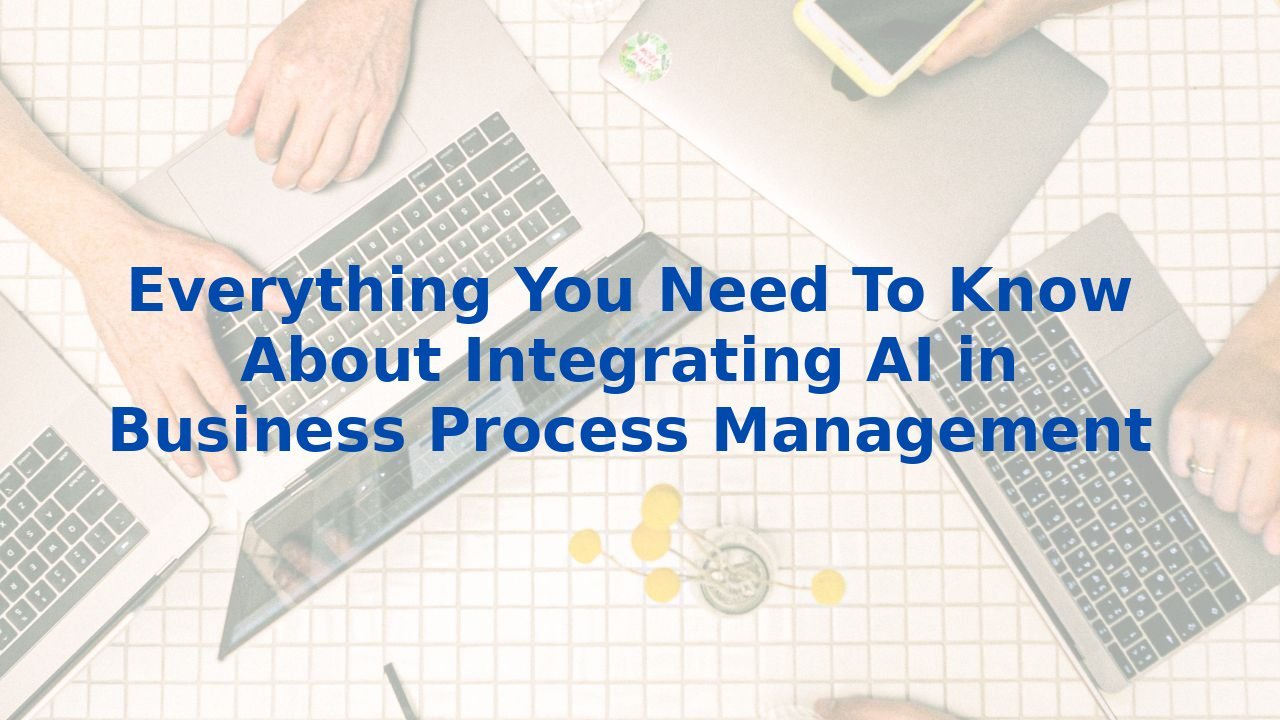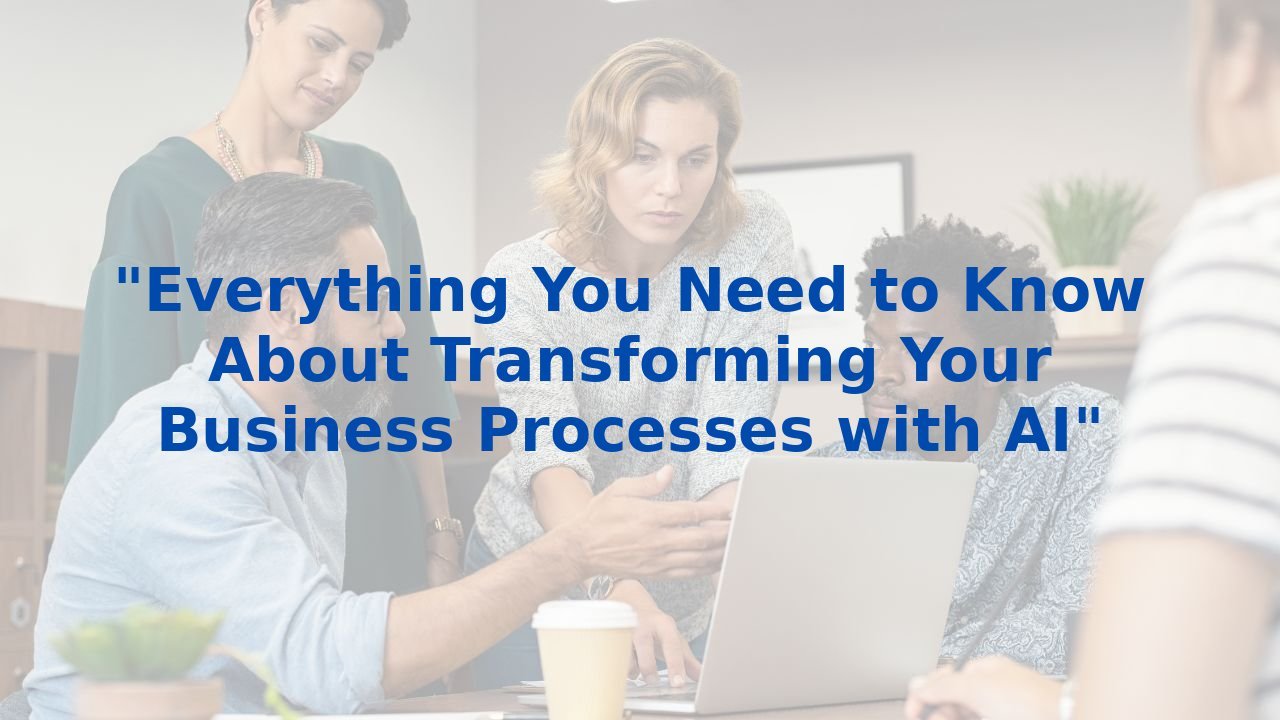Everything You Need To Know About Integrating AI in Business Process Management
The Transformative Role of AI in Business Process Management
In today's fast-paced business environment, organizations are constantly on the lookout for ways to streamline operations, enhance efficiency, and improve decision-making. Business Process Management (BPM) serves as the backbone of these efforts, ensuring that processes are optimized for maximum effectiveness. As we delve into the exciting realm of artificial intelligence (AI), it becomes clear that its integration into BPM is not just an option—it's a necessity for businesses aiming to thrive. In this post, we’ll explore how AI enhances general business processes, driving operational efficiency and fostering a culture of continuous improvement.
1. Data Analysis and Process Building
Imagine being able to sift through mountains of data in the blink of an eye. This is where AI shines. By leveraging advanced algorithms, AI can analyze vast datasets rapidly, revealing critical trends, predicting future outcomes, and pinpointing root causes. The speed and accuracy of data analysis provided by AI empower businesses to make informed tactical and strategic decisions. Moreover, AI algorithms can build the most efficient versions of processes based on historical data, thereby ensuring optimal workflows.
2. Process Automation
One of the hallmarks of AI's integration into BPM is the automation of repetitive and mundane tasks. Robotic Process Automation (RPA), when powered by AI, can take over time-consuming, rule-based jobs that once consumed valuable human hours. Consider this: the time saved through automation allows employees to pivot towards more strategic, value-adding initiatives. This shift not only boosts organizational efficiency but also reinvigorates employee engagement by allowing humans to focus on creative problem-solving rather than monotonous chores.
3. Process Discovery and Mapping
AI-driven process discovery is a game-changer for organizations. By examining extensive operational data, AI uncovers hidden inefficiencies that may not be visible to the human eye. It identifies patterns, workflows, and relationships that can be leveraged to optimize processes. Following this discovery phase, AI aids in process mapping, translating insights into actionable blueprints that visualize interlinked processes. This dynamic mapping keeps documentation up-to-date and relevant, ensuring an agile response to changing operational needs.
4. Continuous Improvement
Continuous improvement is the heartbeat of BPM, and AI acts as the catalyst. By providing real-time feedback, data-driven recommendations, and performance analytics, AI supports organizations in their pursuit of ongoing enhancement. This iterative approach enables businesses to adapt and evolve based on AI-generated insights, fostering a culture that embraces change and innovation. The result? Sustained growth and a competitive edge in a rapidly shifting marketplace.
5. AI in HR and Sales
The impact of AI extends beyond operational processes. In human resources, AI enhances objectivity and enriches employee experiences. By consolidating multifaceted data points—like performance metrics and market trends—AI aids managers in making fair and competitive compensation offers. On the sales front, AI automates various aspects of the sales cycle, suggesting optimal channels, prioritizing leads, and personalizing customer journeys through intelligent recommendations. This not only boosts consistency but also ensures that prospects feel valued and understood.
6. Benefits of AI in BPM
The incorporation of AI into BPM unfolds a plethora of benefits:
- Improved Efficiency: Automation reduces manual workloads, minimizes errors, and enhances productivity.
- Enhanced Decision Making: Predictive capabilities backed by data patterns enable superior decision-making.
- Real-Time Monitoring: Continuous oversight of processes allows organizations to address issues as they arise.
- Cost Reduction: Automating tasks leads to labor cost savings and enhances overall operational efficiency.
7. Training Employees for AI
While AI serves as a powerful ally in BPM, its true potential can only be tapped when employees are equipped to collaborate effectively with these systems. Training in distinct areas becomes essential:
- Understanding AI Capabilities: Employees should be well-versed in what AI can accomplish to harness its true power.
- Data Interpretation: The ability to decode AI-provided insights is crucial for informed decision-making.
- Collaboration with AI: Training should promote a synergistic approach, allowing teams and AI to work in tandem to maximize productivity.
Conclusion
The integration of AI into Business Process Management marks a transformative leap for organizations ready to embrace innovation. Through enhanced data analysis, process automation, discovery, and continuous improvement, businesses can significantly elevate their operational standards while fostering a resilient and agile workforce. As we look toward an AI-driven future, ongoing training will be vital, ensuring employees are prepared to collaborate seamlessly with intelligent systems and fully realize AI's immense benefits. By championing AI in BPM, organizations position themselves on a path to sustained competitive advantage and future success.



